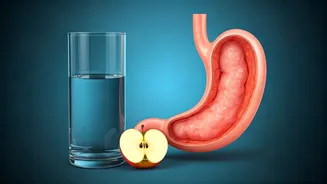Disrupted Digestive Process
Consuming water directly after eating fruits could potentially disrupt the digestive process. Fruits are packed with sugars and simple carbohydrates that
digest at a faster rate compared to other foods. When water is introduced right after, it can dilute the digestive juices, thereby reducing their effectiveness. The weakened digestive fire might not be sufficient to break down the fruits efficiently. This can lead to improper digestion, potentially causing problems like bloating and discomfort. The water essentially washes away the stomach acids that are essential for breaking down the food. Therefore, drinking water immediately after eating fruits can significantly slow down the digestion of the fruits and could potentially result in various digestive issues, affecting the absorption of nutrients and overall gut health.
Nutrient Absorption Interference
Another area of concern is the possible interference with nutrient absorption. The primary reason is the dilution of stomach acids, which are crucial for breaking down foods and extracting essential nutrients. Enzymes play a vital role in this process; they work optimally in a specific pH environment. When water dilutes the stomach acids, it can disrupt this balance, potentially impacting the effectiveness of these enzymes. As a result, the body's ability to extract and absorb nutrients from the fruits may be compromised. This could lead to reduced availability of vitamins, minerals, and other essential compounds the fruits offer. Proper nutrient absorption is fundamental for overall health and well-being, and any factor hindering it can lead to nutritional deficiencies and health problems.
Acidity and Acidity Issues
Drinking water after fruits may increase the likelihood of acid reflux or heartburn in some individuals. Fruits are already acidic to a degree, and when combined with water, especially in the presence of slower digestion, it can exacerbate the acidity levels in the stomach. This heightened acidity can lead to the regurgitation of stomach contents into the esophagus, causing the characteristic burning sensation associated with heartburn. Furthermore, the combination may also contribute to bloating and discomfort. The digestive system becomes overwhelmed, and the stomach may struggle to break down the fruits efficiently. This can intensify the pressure and discomfort associated with these issues, further affecting an individual's digestion and overall health. It is wise to monitor the body's reactions and consider the timing of water intake in relation to fruit consumption.
Potential for Bloating
Bloating is a common digestive complaint, and the practice of drinking water directly after eating fruits can sometimes contribute to this. When water dilutes the digestive juices, it can lead to improper breakdown of food. Partially digested fruits can then ferment in the gut, releasing gases that cause bloating, distension, and general discomfort. In some cases, this can lead to even more severe digestive problems. The timing of water intake in relation to fruit consumption can significantly impact how efficiently the body digests and processes the fruit. Drinking water too soon after eating fruits might hinder the natural digestive processes, potentially resulting in uncomfortable symptoms like bloating. Paying attention to this timing can sometimes help manage or alleviate such digestive symptoms.
Optimizing Digestive Health
To optimize digestive health and mitigate potential issues, there are alternative approaches to drinking water after eating fruits. One suggestion is to wait a minimum of 30 minutes to an hour after consuming fruits before drinking water. This allows the digestive process to begin without interference. Another suggestion is to consume water before eating fruits, allowing it to prepare the stomach for digestion without diluting the digestive juices. Some people also find that warm water is gentler on the digestive system. By implementing these practices, you can contribute to better digestion and overall well-being. It is equally important to listen to your body and adjust these recommendations based on individual needs and reactions to optimize your digestive comfort and health.












